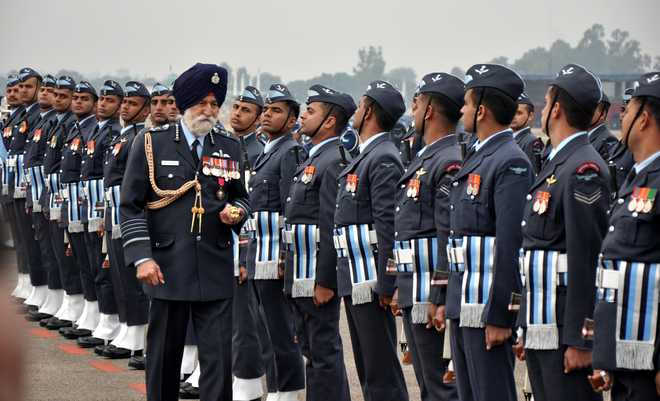When Arjan Singh sold off his farm for IAF personnel
Roopinder Singh
Marshal of the Indian Air Force, Arjan Singh, DFC, has always had a larger-than-life image, and this is one person whose deeds continue to justify it. The Indian Air Force’s only Field Marshal has inspired generations of flyers ever since he joined the IAF in 1939 and was posted to IAF’s Number 1 squadron at Ambala in January 1940, flying in frail Westland Wapitis.
The man who led the IAF in the 1965 war has sold off his farm near Delhi, and entrusted a corpus of Rs 2 crore to a trust devoted to the welfare of retired Air Force personnel. Known for personal probity and punctiliousness, the MIAF has set a wonderful example in using personal wealth for the welfare of others.
(Follow ; and )
“This is leadership from the front, which the IAF has seen right from the time he joined it in 1939, the gallantry in the Imphal campaign of 1944 and the conflict of 1965. It is unprecedented and completely selfless, which is what his actions have been throughout,” says Pushpinder Singh, editor of the Vayu Aerospace Review.
The Marshal of Air Force and Mrs Arjan Singh Trust will seek to open avenues of financial relief for ex-IAF personnel and their dependents who need assistance.
The money has been invested in RBI bonds and it is expected that the returns from it will be Rs 16 lakh and “15 per cent of the interest will be added to the corpus and the rest disbursed to those applying for assistance,” says the MIAF.
MIAF Arjan Singh, his wife Teji Arjan Singh and their son Arvind Singh will be the trustees for life, but it will be run by the president of the Air Force Association and other ex-officio members of the IAF.
“I had full support of the family,” says Arjan Singh. His wife, Teji recalls that when she asked him, why he had put her name on it, he replied: “If you hadn’t agreed, how could I have done it?”
The farm that MIAF Arjan Singh sold was the last link he had with land, which was very dear to him. His grandfather, Risaldar-Major Bhagwan Singh, had a farm near Lyallpur, now called Faislabad, in Pakistan, where the young Arjan Singh spent his childhood, watching planes and dreaming of flying one, someday. After Partition, the family was allotted 80 acres of land in Churwali village, near Adampur, Punjab. “I was also allotted a pucca house. Kartar Singh, a good man, used to look after the land and when I sold it, I gave the house to him. I sold off the land because I could not take care of it as I was in service. In fact, when I told Sardar Swaran Singh (the then External Affairs Minister), in whose constituency my land fell, how much I had sold it for, he chided me for selling it below the market rate,” he said in an earlier interview when this writer wrote his biography. The family also had land in Terai, which was tilled by his father Kishan Singh and other family members.
“I am no longer a Jat as you said in the book, I have no land now,” said Arjan Singh, recalling a comment made in the book, written two years ago, that the Jat in him was kept alive by the farm.
For this Aulakh Jat, giving up his land is a great gesture, and by setting up a trust for the welfare of others, Arjan Singh has set a shining example in a nation where such things have become rare. He has also institutionalised the trust by ensuring that family members do not run it. IAF officials “who are more in touch with the current needs” control it. This makes it even more important that his example be emulated. For this a climate has to be created, where such trusts are encouraged.
The founder of The Tribune, Dyal Singh Majithia, set up a number of trusts to serve the public, including The Tribune Trust, Union Academy (later known as Dyal Singh School and Dyal Singh College), Lahore, Dyal Singh Library and Dyal Singh College, New Delhi. The nation, on the whole, had gained a lot from philanthropic trusts like the Dorabji Tata Trust, which helped set up the first cancer hospital in Asia, and the Birla Educational Trust that runs hundreds of primary schools and colleges.
Unlike these luminaries, MIAF Arjan Singh comes from a service background. His father, Kishan Singh, a civil engineer, worked in Ceylon Railways. However he has always been large-hearted, and eventually it is not what you have that counts, it is what you give that makes a difference. The IAF will surely remember this magnificent gesture of its Field Marshal for a long time.
This piece was originally published in The Tribune on December 24, 2004









